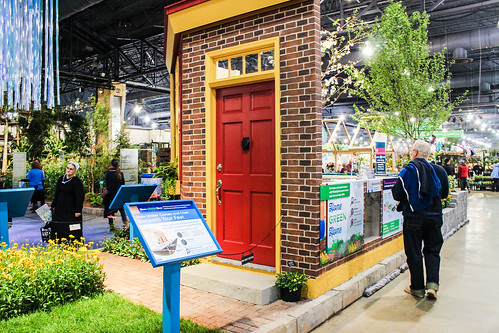Over here at the Philadelphia Water Department, there’s no shortage of people who proudly wear the “water geek” badge, and we’ve also got more than a few proponents of all things green and growing.
So, you can imagine our delight after learning that the theme of the 2018 Philadelphia Flower Show would be Wonders of Water.
After all, PWD has been a wonder of the water world from the beginning: our Fairmount Water Works drinking water plant—surrounded by famous gardens with fountains and sculpture—drew curious visitors like Charles Dickens and Mark Twain from around the globe in the 1800s.
Now that the show’s final weekend is upon us, we can say that Wonders of Water has more than lived up to our nerdiest H2O dreams and grandest go-green expectations.
Whether it’s the lush rainforest spilling over with waterfalls or the far-out landscape of giant cacti showcasing flowers that thrive with almost no water at all, each exhibit is an exquisite exploration of the liquid that makes all plant life on Earth possible.
We got so excited for this year’s water theme, we even created an exhibit for visitors to explore—Home Green Home.
It’s a slice of a Philadelphia block transplanted to the Convention Center floor to showcase all the ways in which a local home interacts with water, from a bright flower-filled stormwater bumpout on the curb to the hidden pipes bringing drinking water to the tap and taking used water away.

There’s lots of signage to provide inside info and each point of interest in the display has a tip to help you protect water, so be sure to stop by and say hello if you’re coming—as long as supplies last, we’ll have Coreopsis seed packets to encourage natural stormwater gardens at home.
PWD will also have iPads where you can share your thoughts about drinking water quality.
The show runs through Sunday, March 11 and is at the Pennsylvania Convention Center, 12th and Arch Streets. PWD’s Home Green Home is located just to the right of the PHS Shop beyond the Grand Exhibit.
If you come in through the Marriot gates above the Jefferson Station entrance at 11th and Market, look for a fun cut-out prop where you can pose as Water Woman, PWD’s trash and pollution fighting hydration superhero.
More Water-Geek Goodies
Of course, Home Green Home is not the only cool place to learn about local water issues at the Philadelphia Flower Show: look for more great stuff like Window on the Watershed, a big installation created through the William Penn Foundation’s Delaware River Watershed Initiative and the Alliance for Watershed Education.
At this exhibit, you’ll meet with members of local waterways groups like the Tookany/Tacony-Frankford Watershed Partnership and encounter “ecological lessons and stories of our own complex freshwater system—the Delaware River Watershed.”
There’s also Down the Drain, showcasing landscaping options—many of which you can get funding for through our Rain Check program—that you can use to manage stormwater and make your home more beautiful.
Be sure to check these out too:
The World’s Drinking Water by American Institute of Floral Designers (AIFD)
This look at select countries that don’t have access to clean drinking water brings awareness to how precious clean drinking water is and how scarce access is for most people in the world. Countries are represented by intricate designs inspired by beautiful flowers.
Urbanization Meets Naturalization by Mercer County Community College Horticulture Program
In a world where our homes often encroach on nature, we need to find ways to make more sustainable choices. Whether we create more permeable surfaces, harvest and utilize rainwater, or make smarter plant choices, every action is a step towards building a more natural environment in an urban setting.
“…nary a drop to drink…” by U.S. EPA Region III
This exhibit has been designed to highlight the connection between watershed protection and our precious drinking water resources. In addition to instilling beauty, the conservation and enhancement of aquatic ecosystems in our own gardens promotes clean and healthy water, while serving as a sustainable landscaping practice.
sus·tain·a·bil·i·ty səˌstānəˈbilədē by W.B. Saul High School of Agricultural Sciences
sus·tain·a·bil·i·ty səˌstānəˈbilədē depicts an urban residence with a landscape that is beautiful as well as sustainable. Features of this landscape include the use of rainwater collected in downspouts and rain barrels for plant irrigation and fountain sculptures. Solar panels are incorporated into a green roof gazebo and many novel planters are made from recycled materials. Diverse plants are displayed in the many micro-environments of this landscape from its rain gardens and hydroponic planters to its exposed roof surface.
Would You Drink the Water? by Williamson College of the Trades in partnership with Stroud Water Research Center
The seniors in Williamson College of the Trades Horticulture Program and the scientists at the Stroud Water Research Center hope you are inspired by this exhibit and learn the importance of small streams in the environment.
In this exhibit, we display some of the best management practices for improving water and habitat quality in small streams, which is where pollutants typically enter the waterway.
Forest buffers on streambanks keep pollutants from entering streams and provide leaves as food and shade to keep streams cool. The exhibit shows how riparian buffers play a critical role in improving water quality, providing aquatic and wildlife habitats for many species.